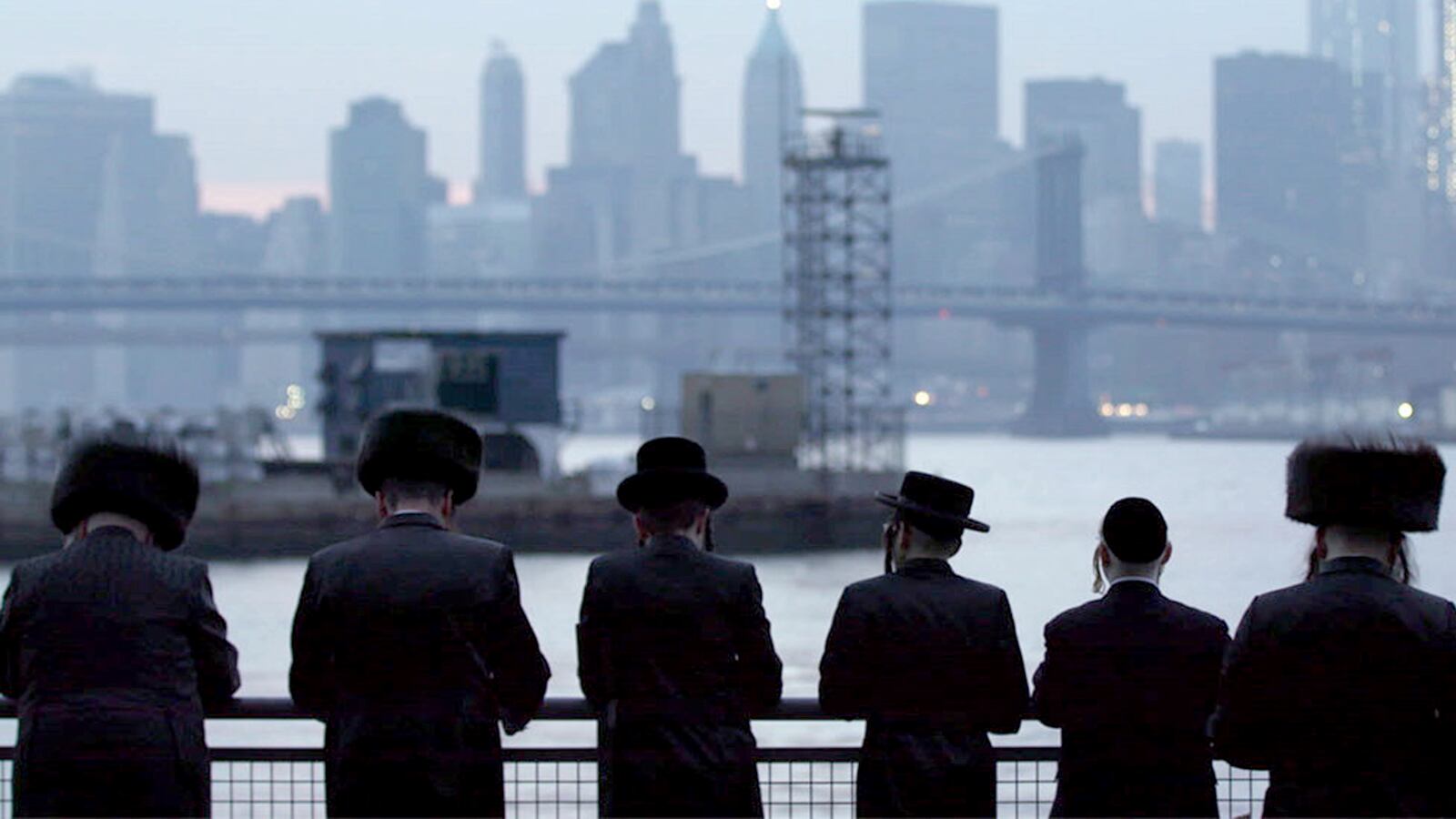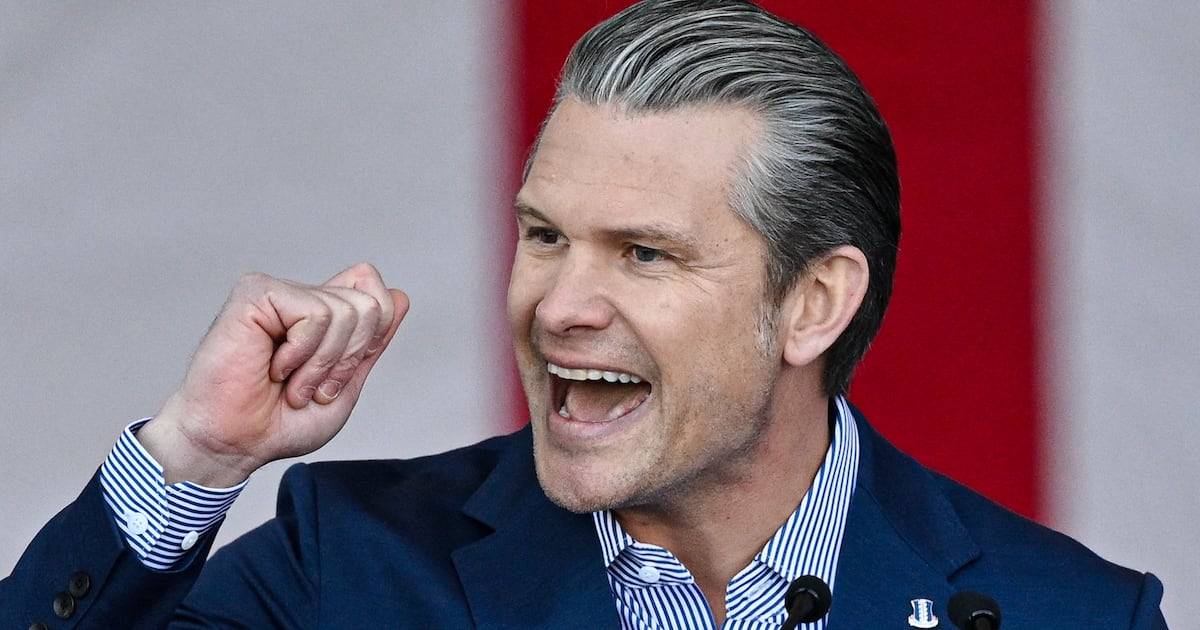The terror and trauma of fleeing fundamentalism is front and center in One of Us, a harrowing new documentary about three individuals trying to leave their Hasidic enclave in Brooklyn, New York. An up-close-and-personal view of intimidation and exclusion, as well as bravery and sacrifice, it’s another stellar non-fiction effort from Heidi Ewing and Rachel Grady (Jesus Camp, Detropia), who intimately chart the ordeal of their trio as they strive to break free from their oppressive cultural-religious environment and, in doing so, achieve a measure of internal and external liberation. It’s a film about escape—albeit one that, for the documentarians themselves, tasked with gaining access to the closed-off Hasidic world, was also akin to a break-in.
“We mostly endeavor to have very special access to something before we make a film,” explains Ewing a week before One of Us’s Oct. 20 premiere on Netflix. In this case, that was an especially difficult process, given the fiercely protected insularity of the Hasidic community. “We really love to explore the nature-versus-nurture questions. And religion, and being raised a certain way, is just the best way to explore that,” adds Grady. “We both live in New York City, and have been sharing the common spaces of the city with this group of people that you have zero access to. So naturally, you become curious. It was a group that we always talked and thought about, and Heidi lives in an orthodox neighborhood, and I live adjacent to an orthodox neighborhood, and I’m Jewish. It’s in the milieu of being a New Yorker. But of course, we never thought we would have an access point, because they don’t just let outsiders in—and that’s by design. The whole story is about not letting outsiders in.”
Their “in,” it turned out, was Footsteps, a nonprofit outfit that provides counseling and support for men and women thinking about leaving their Hasidic homes and neighborhoods. However, with Footsteps determined to protect the identity of its members, replete with not even listing its physical address on its web site—since those who are discovered visiting the association can suffer severe reprisals from fellow Hasidim—Ewing and Grady had to quickly commit to a long-term project of gaining the organization’s trust.
“We were persistent. We sat with them, they looked at our work, and they spent many months deciding if [cooperating] was a good idea or not—talking to their board, and talking to us, and asking us to state our intentions. They very, very, very jealously guard their membership,” says Ewing. After six months of working with the group, they were finally granted access to attend public events. “That was the big win,” Ewing acknowledges. Nonetheless, it took another six months to pinpoint the people they wanted to follow, followed by two more years of development and shooting—a lengthy commitment that, Grady asserts, was anything but deterring. “If I’m excited about something—and I was really excited and engaged on this film from the very beginning, and continue to be—then it’s not daunting. You kind of park it in your brain; there’s no rush.” Moreover, with Netflix providing vital financial support, they were able to focus wholeheartedly on the film, which was ideal, because as Grady makes clear, “We just didn’t want to work on anything else.”
They found their “stars” in Luzer, a former Footsteps member now trying to make it as an actor in L.A. after having abandoned his wife and children; Ari, a teenager who suffered sexual abuse at the hands of an elder, and is struggling with drug addiction; and Etty, a young mother of seven who becomes the target of harassment and literal assassination attempts for seeking to divorce her husband (a big no-no) and maintain custody of her brood (an even bigger no-no, since it means they’ll be partly raised in a less-religious household). Together, their stories comprise a triptych of courage under intense fire. They also provide an intimate view of a secluded community that maintains its existence—and control over its members—by keeping them ignorant of the outside world (in a stunning admission, Ari reveals he didn’t learn about Google until he was 14) and threatening punishment for even entertaining the thought of straying from their holy path.
Convincing Etty, Ari, and Luzer to participate required some careful cautioning from the directors, who had to make sure the threesome fully understood that, once released on Netflix, their tales would be anything but private. “We filmed a lot of people over the first year-and-a-half, trying to figure out what our story was, and the subjects that we ended up focusing on, we didn’t have to talk them into anything,” remarks Grady. As Ewing elaborates, most of the people they initially met “didn’t have a grasp of how big this was going to be.” Thus, “You’ve got to be careful, especially with people like this. We would hear ourselves saying, ‘Assume this is going to be seen by your parents, and the kids in the yeshiva who have Netflix illegally on their phone. Assume all your siblings and your parents and everyone you’ve ever met is going to see it. Do you still want to do this?’ It was that kind of conversation.”
Part of the reason Etty, in particular, chose to work with Ewing and Grady is that she was in dire straits, and needed to make her systematically marginalized voice heard. “Etty, when we met her, she was just beginning a journey. She was in crisis, but she didn’t quite know that yet,” says Grady. “I think we were a lifesaver.” There was a catch, however—to protect her anonymity, Etty initially stipulated that her face couldn’t be shown on-screen. “It’s a visual medium—we don’t make radio,” Ewing says she explained to Etty. “She had so much to say, though, that we started meeting with animators—we were planning on animating her and disguising her identity. We shot her in myriad ways, not knowing exactly what we were going to come up with creatively; sometimes filming her face, sometimes not. And then she changed her mind. So in the film, we tried to transmit that back to the audience.”
It was, as they say, a “bold choice,” and one they replicate, cinematically, in beautiful fashion, providing a piercing visualization—aided by shots of Etty donning and removing her wig in the mirror—of the woman’s difficult, and cathartic, transformation from invisible victim to autonomous survivor. Actually operating in the Hasidic community, however, proved its own challenge, especially considering that Ewing and Grady weren’t just outsiders; they were also independent women. When it came to the practical task of shooting, which was accomplished in public spaces and without the use of hidden cameras, canny tactics were needed. “One of our strategies was ‘Send the dudes out’ [to film]. Sometimes we’d stay in the car, and be like ‘Follow him here and there.’ You do what it takes to not interrupt the flow, because two secular women standing on the street with Ari—we can’t pass. Even the way we walk is so different. You just can’t fit in.”
Though One of Us paints a distressing portrait of Ari, Etty and Luzer’s search for freedom and peace, Ewing and Grady are cautiously optimistic the overall experience has been a positive one for their subjects. “In those [initial festival] screenings, I think it’s been really empowering for Ari and Etty,” Grady opines. “For Luzer, he left eight years ago; he has a different relationship with the community, and himself, and where he is, and his identity. They [Ari and Etty] are still very fresh, and still emerging. I think we’ll see what it’s like to come of age—this film is part of them coming of age… I hope it’s incredible for them.” Ewing concurs. “They’ve gotten a lot of hate in their lives. They haven’t gotten a modicum of support and love and encouragement. Barely none. So they’re due for a big dose of encouragement. And I hope the audience out there gives them that.”
As for their own role in One of Us, the directing duo admit they were aware of the issue of intervention—when to step in and provide literal aid to those they were documenting, and when to remain “objective” observers—but both are certain they didn’t unduly impact the finished work itself. “I’m pretty confident on this film that we didn’t affect the outcome,” asserts Ewing. Rather, she hopes it will now encourage others to lend aid to the threesome, who remain in need. “I hope that through this film, someone offers to pay for their education, or gives them a hand—I think that would be a great outcome.”
To Grady, preserving that sort of artistic equilibrium simply meant staying true to their instincts. “For us, you have to go with your gut. Because documentary filmmakers can or cannot follow the rules of journalists. It’s kind of a no man’s land, to be honest. I think there are principles that journalists have that make a lot of sense, and I’m religious about them—no pun intended. And there are some that are irrelevant, to us. It’s case-by-case, and really, the litmus test is you have to sleep at night and know that you’re not an asshole.”






